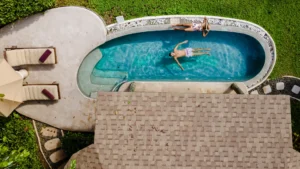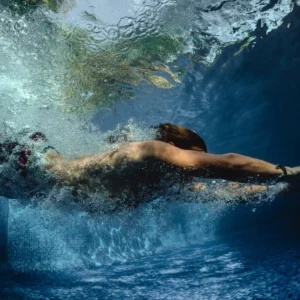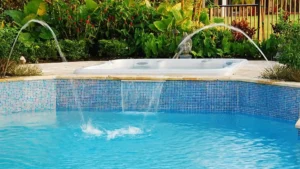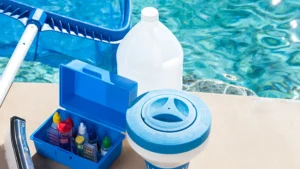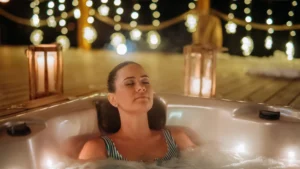
When can babies go in the pool? New moms and dads face a million questions about their little ones, many of which you never imagined before parenthood. One common wonder: when is it safe for my baby to go in the pool? The good news is that babies can safely enjoy the water from around 6 months of age, when their immune systems are stronger and they can hold their head up steadily.
Before that, water exposure should be limited to gentle baths and splashes. Here’s what you need to know to introduce your baby to the pool safely and make water time fun for both of you.
Why are babies so sensitive to water?
Before the baby can become accustomed to water, you need to put this matter seriously into consideration. Pediatricians strongly stress the need to increase the age of the infant before exposing him or her to pools or other traditional bodies of water.

- Development of Immune System: Infants under 2 months have developing immune systems and are practically more prone to infections. Hence, such young infants should not be exposed to pools, lakes, or oceans.
- Thermoregulation Networking: The skin-to-body ratio of babies is higher when compared to that of an adult or an older child, thus limiting their thermoregulation capabilities. This, therefore, predisposes them to heat-stroke and frostbite at times, especially when the water temperature fluctuates. Ensure the water temperature is agreeable before placing the baby inside and keep an eye on him real close.
- Communication Ineffectiveness: An infant cannot express himself or herself in the case of discomfort or distress. This imposes an extra responsibility for the guardian to be watchful and sensitive to any cues that will inform him of an infant’s discomfort, ensuring that the infant remains safe and comfortable in the water. However, others believe that around six months is the appropriate age to introduce your baby to a swimming pool.
According to Infanswim.com, parents should consider signing babies up for swim lessons because many places offer infant classes. By the time your little girl or boy is nine months old, they’re technically able to be taught how to swim from one adult to another for about five seconds.
Baby’s first swim
Parents should make the choice to bring their babies in the pool a personal one because no two babies are the same. Whether you wait until they are a year old or you take a swim together at six months, you should ease them into the water gently.
- Take advantage of bath time to prepare them for a dip in the pool. Pour a little water over your baby’s head and hair but also let it splash on his or her face as well, suggested Parents.com.
- Once you think they’re ready physically and mentally, get them ready for pool time by applying a baby-specific sunscreen and suiting them up in a little life vest.
Baby pool safety

Once your baby is ready to get in the water, even a plastic kiddie pool can be a safe and fun option if used correctly. Experts at infantswim.com recommend following these rules to keep water time safe and enjoyable:
- Be close and in contact: There should always be someone in the pool with your baby, with as much direct body contact as possible, for maximum safety.
- Do not use flotation devices: Water wings or inflatable rings are unstable and can easily tip your baby over; it is best not to let them go vertical at all, so they maintain the proper body posture when swimming, which is flat in the water.
- Follow your baby’s cues: Every baby will experience water differently! If your baby begins to cry it could be that they are hungry, need a diaper change, or they simply have had enough!
Never force your baby to stay in the pool, follow their lead. Plastic kiddie pools are easy to use and shallow as well, which makes them perfect for introducing your baby to water gently and conveniently at home.
However, nagging and supervision cannot replace full attention and supervision.
Keep it clean
After you expose your little person to water, cleanliness becomes your new best friend. Babies’ immune systems are still developing, so even a tiny bit of dirty water can contain bacteria and potentially make them sick.
Pro Tip: Periodically check the water clarity and water chemistry, even if using a shallow plastic kiddie pool.
A simple rinse and refill can do wonders! For bigger pools, don’t roll the dice, call your local amenity pool service team to schedule a professional service. Allow them to ensure your pool is crystal clear, properly filtered and completely safe for your little swimmer.
Extra Pro Tips for a Happy Splash:
- Rinse baby off before and after pool time to minimize skin irritation.
- Disinfect toys and pool accessories regularly to minimize bacteria spread.
- Keep swim sessions short at first during baby’s body acclimatization period.
FAQ's
1. How early can you take a newborn swimming ?
Swimming is a safe option for babies from about 6 months of age when their immune systems are stronger, and they can consistently hold their head. Newborns younger than 2 months should not be in pools, lakes, or oceans since their immune systems are still developing. Before six months, the only exposure to water that they can have is in gentle bath time or splashing.
2. Can newborns go in the pool?
Newborns are typically too young for swimming pools since they cannot regulate their internal body temperature and are very open to infections. Once babies get closer to 6 months of age, their parents can make the transition into the water, even just in shallow plastic kiddie pools or through adult-led and supervised swimming.
3. Are chlorine pools safe for babies?
Yes, chlorinated pools can be safe for babies if they are well maintained. Just ensure the order levels of chemicals are at the correct amounts. After swimming be sure to also fully rinse your baby after they swim. Always closely supervise and do not allow your baby to intentionally swallow pool water.
4. When can I begin swim lessons with my baby?
Many infant swim programs will start around 6-9 months. At this age, we can start to teach them basic water skills such as floating (with adult support) and even transfers from adult to adult (hand-to-hand holding). It is best to follow the babies cues and comfort levels, and never force them to swim.
5. How do I get my baby ready for their first time in the pool?
An appropriate next step might be to expose your baby to water mildly at bath time. During bath time, there may be opportunity to pour a little water over their head, and support a small splash on their face. Make the duration of the first pool lesson short and fun, and gradually increase the duration of each pool lesson as your baby becomes familiar and comfortable in the water.

